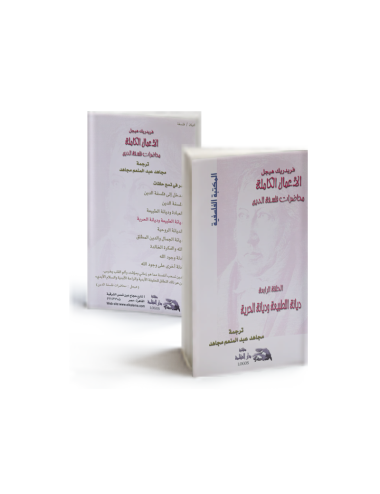History of Aesthetics
Man creates masterpieces of literature and art, but he does not want to be satisfied with this, but rather he wants to understand what is behind his creativity.
0.114 kg - 200 kg
Man creates masterpieces of literature and art, but he does not want to be satisfied with this, but rather he wants to understand what is behind his creativity.
The higher is also the deepest, and in it the separate moments are grouped together in the subsequent pigmentation of the subjective unity, the need for the interconnectedness that characterizes directness is eliminated, and the separate moments are returned to the subjective unity.
ÙابØÙر بتتÙاØÙÂ
Ù٠دÙÙا اÙعاشÙ
ÙÙ ÙÙ ÙØظة Ø´ÙÙد
ÙÙجÙØ© بÙسابÙ
ÙÙر اÙÙÙا٠عÙÙÙ
ÙÙ٠اÙÙسا٠عاÙÙ
أشر٠Ùاعر
What if imagination and art are not, as many of us might think, the frosting on life but the fountainhead of human experience? What if our logic and science derive from art forms, rather than the other way around? In this trenchant volume, Rollo May helps all of us find those creative impulses that, once liberated, offer new possibilities for achievement. A renowned therapist and inspiring guide, Dr. May draws on his experience to show how we can break out of old patterns in our lives.
For Hegel, thought is not philosophical if it is not also religious. Both religion and philosophy have a common object and share the same content, for both are concerned with the inherent unity of all things. Hegel's doctrine of God provides the means for understanding this fundamental relationship. Although Hegel stated that God is absolute Spirit and Christianity is the absolute religion, the compatibility of Hegel's doctrine of God with Christian theology has been a matter of continuing and closely argued debate. Williamson's book provides a significant contribution to this ongoing discussion through a systematic study of Hegel's concept of God.
The normal, eternal, absolute idea - in its eternal existence - in and of itself - is God in his eternity or eternity before the creation of the world, and outside the world.
The main characteristic here is subjectivity as a self-determining force - and this subjectivity and rational power that we have met before in the form of the one who has not yet been defined within himself and whose goal - as it appears in the realm of reality - is in this the most specific thing possible.
The separation of religion from the subject manifests itself in the emergence of an actual will. In the will I am an actual and free being, and I present myself against the subject as another, in order to represent it with myself by removing it from that state of separation.
The world houses people equally with natural things. When the world is thus treated as a gathering or even a gathering of natural things, it is not conceived as nature, and we do not understand that it is something that is in itself a holistic system, a system of regulations and arrangements, especially laws.
This is the first of two volumes of the only English edition of Hegel's Aesthetics, the work in which he gives full expression to his seminal
As a life raft for beginners and their supervisors, Where to Start and What to Ask provides all the necessary tools for garnering information from clients. Lukas also offers a framework for thinking about that information and formulating a thorough assessment. This indispensable book helps therapeutic neophytes organize their approach to the initial phase of treatment and navigate even rough clinical waters with competence and assurance.
What we must begin with is the question: How can a beginning be formed? This - at least - is a formal requirement for all sciences, and for philosophy in particular, and that there is nothing that must find a place for it in it that does not occur with proof.
The true "spiritual enthusiasm" is what we generally call "the church". This expresses this grouping, towards what has already been renewed.
Hegel's lectures have had as great a historical impact as the works he himself published. Important elements of his system are elaborated only in the lectures, especially those given in Berlin during the last decade of his life.
There is a common theme linking these studies this topic comes from the depth and diversity and richness of human nature from the side, and the other side also stems from humans and worthlessness in this nature.
In this book by Rollo May discusses some of the characteristics of human nature and human under the title of "problematic".
Man's Search for Himself by Rollo May is a captivating and introspective guide that is a perfect fit for readers seeking a deeper understanding of themselves and their place in the world, particularly those grappling with anxiety, depression, and feelings of emptiness who are looking for a nuanced and insightful exploration of the human condition.
This book is both a testament to a great thinker and a still vital strand of thought in the comprehension and critique of the modern organized world. It is essential reading for younger scholars and a radical reminder for those steeped in the tradition of a critical theory of society.
A man asked the Greek philosopher Aristotle: What is the use of studying beauty? The great answer came from the great philosopher: This is the question of a blind man.
This book is one of the few books and the ever-increasing, which explores a very important area: relationship of mutual and continuous interaction between religion and mental health.



















